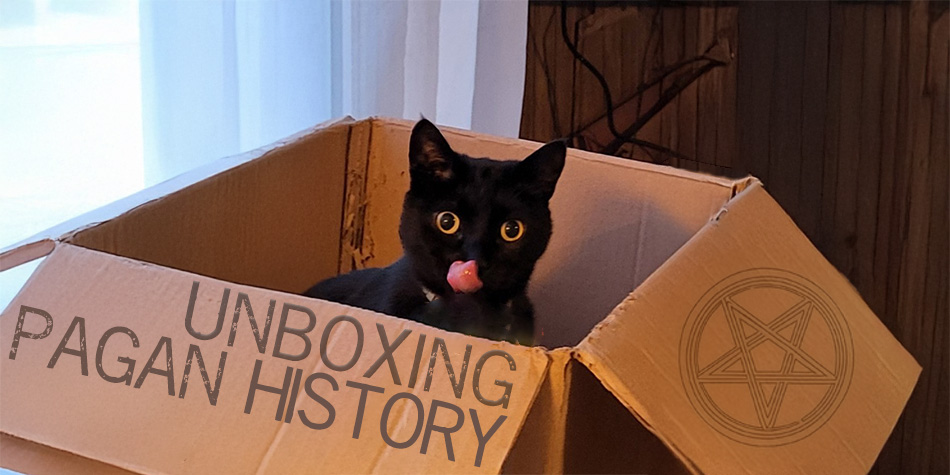
By Cat Gina Cole
Sometimes the voices of the past need to be heard again. Among those whose words still echo with power and relevance is Dr. Leo Louis Martello—a magician, writer, activist, and unapologetic firebrand whose work feels urgently necessary in our current times. Born in 1930 into poverty and hardship, Martello’s early life was marked by difficulty, but he refused to let adversity silence him. Instead, he rose to become one of the first openly gay Pagan priests of his era: outspoken, defiant, controversial, and deeply committed to justice.
There has long been speculation—and backlash—regarding Martello’s initiations and Witchcraft lineage. But this criticism ignores the reality of the era in which he lived. At that time, many covens and family traditions were secret by necessity. Verification was nearly impossible, and secrecy often meant survival. Martello, aware of scholarly objections to Margaret Murray’s witch-cult hypothesis, nonetheless defended the idea of an unbroken oral tradition. To him, it made perfect sense that lived, ancestral Witchcraft might evade the textual records favored by historians.
And in truth, it does make sense. For centuries, anyone who was not of the Abrahamic faiths was considered “pagan”—a label imposed from the outside, not an identity claimed from within. My own experience reflects this; I come from such a line and was sworn to secrecy in 1972. What mattered most about Martello was not the debate over credentials, but the life he lived and the work he did. His actions, words, and fierce dedication proved him to be an exemplary Witch and one beloved by much of the Pagan community.
Lori Bruno—Martello’s friend and co-founder of the Trinacrian Rose Coven—wrote in 2002:
“Where do I begin to write about a legend? A man who gave tirelessly of himself for the fight for human rights, animal rights, gay and lesbian rights, and for Witches worldwide to worship in complete freedom? Leo Martello was an amazingly compassionate man. He never turned away anyone who genuinely needed his time and effort in the pursuit of a just cause.”
Martello and the Turning Tide of Stonewall
The Stonewall Uprising of 1969 was the spark that ignited the contemporary LGBTQ+ rights movement. It erupted after yet another discriminatory police raid on the Stonewall Inn—an illegal gay bar and one of the few places queer people could gather safely. For six days, patrons and neighbors fought back against police harassment in a historic act of community resistance.
Martello, himself a gay man, quickly became involved in the political aftermath. He joined the newly formed Gay Liberation Front (GLF), where he was elected the group’s first moderator. But first, he attended a meeting of the Mattachine Society—the older, more conservative LGBTQ+ organization—where he was shocked by their disapproval of the riots. Their framing of homosexuality as a mental illness was, to him, deeply harmful and self-loathing.
In response, he penned an essay arguing that homosexuality itself was not the problem—society’s attitudes toward it were. This sentiment helped shape the emerging movement.
When the GLF later split, Martello helped found the Gay Activist Alliance (GAA), continuing to write and organize as the struggle for rights intensified. He authored a regular column, “The Gay Witch,” for the GAA’s newspaper GAY, which quickly reached a readership of 25,000.
He also led protests against The Village Voice for banning the use of the word “gay,” instead insisting on the more sanitized “homophile”—a term Martello derisively dismissed as sounding “like a nail file for homosexuals.” His stance helped normalize the term gay as a proud, political identity.
A Witch’s Activism
In 1970, Martello founded the Witches International Craft Associates (WICA), bringing together covens and traditions to support Pagan religious freedom. Under its banner, he organized the famous Central Park “Witch-In” on Halloween 1970, despite resistance from New York City officials.
He later founded the Witches Anti-Defamation League, dedicated to combating harmful stereotypes and discriminatory portrayals of Witches in the media—a precursor to modern Pagan advocacy organizations.
In 1972, he lectured at the first Friends of the Craft conference and, in 1973, traveled to England, where he was fully initiated into Gardnerian Wicca by Patricia and Arnold Crowther. Throughout his life, he continued to challenge homophobia within Paganism, writing “The Gay Pagan” for Green Egg magazine, in which he bluntly asserted that homophobic Wiccans were “sexually insecure.”
He also championed feminist and Dianic Witchcraft, supporting the work of Z. Budapest and advocating for the autonomy of covens. His 1970 W.I.C.A. newsletter is full of such statements, including:
“Say it loud, I am a Witch and I am proud!”
And:
“Live and let live… let each witch do their own thing based on ‘harm none,’ but with the right to self-defense.”
Martello was equally forceful in condemning the “white magic vs. black magic” dichotomy, calling it a form of unconscious racism rooted in Judeo-Christian conditioning. His clarity on this issue remains relevant even today.
Why Martello Still Matters
More than fifty years later, the struggles Martello fought—rights for Witches, Pagans, women, and LGBTQ+ people—are still live issues. His boldness, his irreverent wit, and his willingness to confront injustice head-on give us a blueprint for activism now.
The voices of ancestors and predecessors matter. They remind us how we came to have the rights we do. Without people like Dr. Leo Martello, many of us would still be deep in the shadows, too vulnerable to speak.
So hail to Dr. Leo Martello—unquiet, unapologetic, uncompromising—a witch, a warrior, and a catalyst whose fire still burns and whose work still calls us forward.
To learn more about Cat Gina Cole, visit her website at www.catginacole.com.
